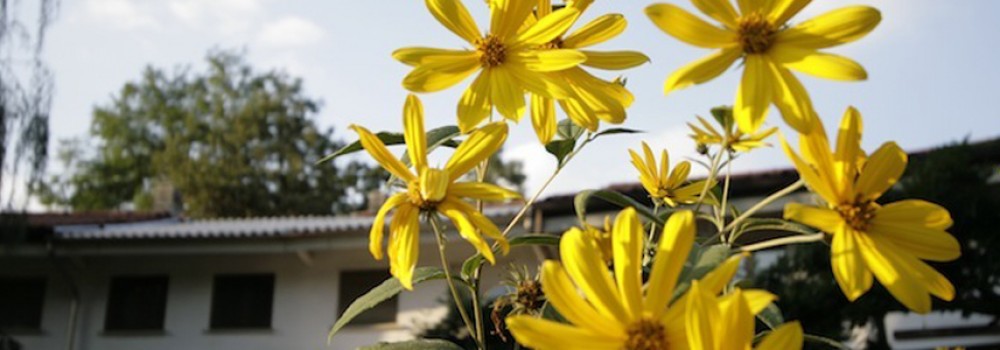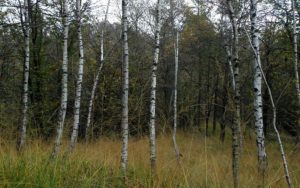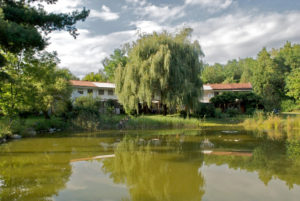By Etta Madden

“We are only actors in a script already written.” These words glowed like a guiding lamp on my computer screen as I read responses to questions I had sent to Francesca and Mirai about “passing the torch” at Villaggio Verde, a spiritual ecovillage in Italy’s Piedmont region. I met the two long-time members last July, when Timothy Miller and I made a short visit to the community. The visit included a brief tour of the grounds with Mirai, the current agricultural manager, and Francesca, who showed us the library, where she spends much of her time organizing its extensive holdings. Our brief but engaging time together, on a hot Sunday afternoon, could have been in a sleepy, small community anywhere in the world. Because I had more questions than answers when Tim and I completed our tour, I wrote afterward to ask Mirai and Francesca more directly about future visions at Villaggio Verde.
Their responses included Francesca’s description of members as actors in an already-written script—perhaps pessimistic to readers unfamiliar with their beliefs. As she explained, these ideas align with founder Bernadino del Boca’s teachings and capture the community’s spiritual emphasis and Eastern traditions of unity of time, space, and all forms of being. While Francesca’s responses were not surprising in light of the founder’s teachings, some differences between her answers and Mirai’s are notable. Their thoughts about transitions reinforce how variable the approaches may be as community members face change. Those diverse views, as well as some general information about Villaggio Verde, follow here.
Established in 1982 and known officially as Villaggio Verde Comunità Acquariana, the community now consists of about 24 members, including six children, on an agricultural complex of eight hectares in the plains north of the Po River, in the province of Novara, about halfway between Turin and Milan. The founder del Boca, now deceased, began teaching on theosophy and spirituality in Milan in the 1970s. He and some students in the courses initiated the communal project, which emphasizes spirituality grounded in Eastern religions; meditation practices; workshops for children and adults; and sustainable living, including organic agriculture. Most members work outside the community; Francesca and Mirai are among the exceptions. Each family unit conducts daily life independently. The group activities now consist of weekly meetings and, as needed, maintenance of the communal spaces.
Changing Roles in Community
Both Francesca and Mirai have held various responsibilities at Villaggio Verde since their arrivals. Mirai came to the community in the late 1980s as a child, brought by his parents, who were seeking a new way of living. Francesca came to Villaggio Verde as an adult, following del Boca’s teachings on her own. Mirai, the younger of the two, focuses on day-to-day activities that keep the community functioning and alive within its current context—organic farming, sustainable agriculture, and local sales of produce. Meanwhile, Francesca labors to preserve the community’s history and past endeavors, even as its educational activities are part of the present.
Mirai’s explanation of his roles was detailed and concrete. For about a decade he has been the president and legal representative of the community. And for the last five, he has also headed Farm Market Villaggio Verde, a business concerned with the cultivation and sale of produce from land leased from the community. He runs the business with his younger brother, his wife, and an older community member, Renzo, Francesca’s husband.
For even longer―about 20 years―Mirai has been a member of the advisory board for the “Friends of Villaggio Verde”―a 250-member support association. He has served as secretary and treasurer of the board and has helped to organize seminars and events, communicate with members, recruit guests and visitors, and prepare food in the communal kitchen. For a while he worked with guest lodging, which is now a B&B run by another family in the community. Now Mirai helps recruit and manage WWOOFers—both Italians and those from outside Italy. And he is responsible for maintaining relationships with outside organizations such as RIVE (the Italian Ecovillage Network) and CONACREIS (a national association for research in ethics and spirituality).
During the years Mirai served in these roles, he was farming communally and “also busy with maintaining the property and cleaning the communal spaces, producing and selling bread, and managing a little store with foods, books, and objects for members of the community and the [friends] association.” These responsibilities have rotated among himself and other members, as they have worked together for the community’s well-being.
Francesca, too, has held a variety of roles. She explained that she was “busy with promoting the most important cultural activities of the 1990s.” These included the del Boca-inspired “Yoga of Beauty”; the concrete “realization” of Utopia through establishing the community; “Education in the New Age”; and an activity called the “Dream of Pan,” with nature and ecology as spiritual keys. But she added, “Now I am no longer active. There are other things with which I am occupied.” Chief among these is organizing the library, which has become “the single and most important interest of my life,” she explained. It is still in a “dormant” phase—not yet having realized its potential.
When I asked Francesca more about the holdings, she described it as “a library of cultural anthropology, reflecting del Boca’s desire to gather testimonies in all fields of the weighty evolutionary path of humanity.” The Foundazione Bernardino del Boca, established at his death, “promotes his thoughts and his works—both literary and artistic,” in part through the library, Francesca explained.
The library began with del Boca’s personal collection. Always a collector of books and art, del Boca had a passion for learning that emerges in the library shelves. According to Francesca, “the library’s central and most important nucleus consists of thousands of volumes that he acquired from throughout the world and over a period of many years. The major part of these books trace the arguments and research of all spiritual inclinations.”
Future Visions: Similar Philosophies, Differing Concerns
In response to my question of her thoughts of the future, Francesca wrote, “Sia quello che ‘Dio vuole.’” “What God wants will be. God’s will be done.” She replied with the same phrase when I asked her of any concerns she might have about not finishing the library’s organization, given the scope of the collection and her age and working pace. “Sia quello che ‘Dio vuole.’”And finally, when I asked about future leadership or the arrival of new members, she responded, “I have no previsions of any type. We are only actors in a script already written.”
Francesca’s written words convey the peaceful energy and contentment that she emanated in July as she welcomed us into the library, exuberantly showed us row after row of books and pamphlets, told us about del Boca, and graced us with a photo of a shelf full of crystals. In the short time we had together, we discussed some of the basic philosophies of life, the unity of all organisms, and how broadly the term organism serves as label.
Mirai’s responses to similar questions about the future overlapped with Francesca’s at a conceptual level, while his concerns at the more practical level of daily activities also emerged: “To tell the truth, I don’t think much of the future of the community because I am very busy with the work of the present or, at least, imagining my personal future.”
He elaborated, “What interests me is to stabilize as much as possible the actual living situation (including resolving problems of housing for children who are now adults), and finding a way for increasing the capacity for agriculture to do more than to produce food for the community—to generate a financially fair way for people dedicated to living at the village to not need to search for work outside in order to survive. The village activity demands constant maintenance of the land and the buildings, but it also has potential for developing related activities, such as labs for food transformation, a restaurant, and teaching workshops that would provide employment for members of the community beyond the four already actually working here.”
Mirai hopes “to offer these opportunities to young members and eventually new arrivals.” In fact, he explained, “new members would be necessary to sustain the transition of the older ones, even if in this passing of the generations there are difficulties of both the relational type (diverse modes of seeing and doing things) and of a logistical type (whether to allow new members to enter and if they would be able to build new houses or would have to go to the old ones).” All of these issues are, as Mirai explained, “complicated, for financial reasons—such as the lack of money—and legal ones—such as construction permits and bureaucratic obstacles connected to our cooperative nature and shared property.”
Mirai’s visions and concerns invited deeper and more specific soundings. So I asked about older adults. In addition to his parents, nine other member are older than Mirai. In a community of 24, that’s almost 50 percent. “That these older people will have health problems soon is to me a fountain of worry,” he explained. “They would lose the capacity to fulfill their roles and their independence and autonomy. The fact that we live in a rather isolated area, little served by public means, and the two-level nature of our houses doesn’t help people with physical difficulties. Above all, for single people and others without children, because no one has a very large retirement fund for supporting a full-time assistant, it will be a task of the younger members of the community to take care of them.” Finally, he added, “among the young, I don’t see that everyone has the same disposition to take on this responsibility.”
A Second Generation: What Becomes of Young Adults?
Mirai’s comments about younger members tap into the well-known theme of young adults who have grown up in the community. Do they stay or do they go? Mirai offered an answer. “Some boys and girls (five, to be exact) have left with their families.” He also noted, “My brother went to Torino to study and work about 10 years, but then he came back to live here with his partner.” He added, “The other three young adults—three sisters in their 20s—who grew up here now remain with their parents.”
Mirai confessed that he has not been without moments of doubt about his life there. He had “a rich experience,” he explained, living outside the community while he studied at the University of Pavia for five years, although he returned on weekends and while working on his thesis. Then he decided to remain at Villaggio Verde for several reasons: an idealistic connection to the project’s principles and scope, emotional connections to family and other members, the way of life in the country and in nature, and the lack of alternative concrete opportunities for living and working.
Even after the post-university decision, Mirai has had moments of questioning his life at Villaggio Verde. “About 10 years ago,” he told me, “at the end of a period of personal difficulties, I thought about leaving…at least for a period of reflection and comparison.” He planned to visit other Italian ecovillages (members of R.I.V.E., the Rete di Italiani Villaggi Ecologici). But “a detached retina a few days before my planned departure made me postpone and then give up the idea.”
Relations to RIVE
Given Mirai’s concerns about the future, and his connection to outside associations, I wondered how other communities might be of help to those at Villaggio Verde as they face “passing the torch.” In fact, the day Tim and I visited fell in the midst of the annual RIVE and GEN (Global Ecovillage Network) conferences. Observing that Mirai was not participating, I asked about it.
Traveling outside the community is challenging for him. He explained, “The farm activities and administration of the community only permit me to travel occasionally.” Most years, Mirai’s travels have been only day trips a couple of times a year, usually with family, to a lake, or to hot springs, or to the mountains. But for “a few days each year,” he is able to travel “to meetings…or to help with events and classes.”
In fact, other communities and these workshops might help Villaggio Verde’s future in a couple of ways, Mirai explained. They might “help us with their experience…to confront the periods of transition. Even though I know that it would not be easy for everyone to accept help, one or more external facilitators who know the intentional community world would be useful. They would help us to see the problems and resolve the conflicts better. They would help us to clarify and focus better on our objectives.” There could be other benefits as well, he added. “It would also put us in contact with new potential members, or provide solutions for those that would like to go to live elsewhere.”
Mirai concluded with a comment that speaks to communication and negotiations within community. “I have expressed my thoughts many times, but it doesn’t seem to me that these are necessarily shared by everybody.” His message reminds us that people sharing common intentions may disagree on how to realize them.
Francesca’s and Mirai’s openness invited me to pose a question about the community’s relationship to the Federation of Damanhur, another spiritual ecovillage about 100 kilometers away (an hour by car). Their responses: their beliefs are different, and their practices are different. With no comments on or judgment of Damanhur, Mirai and Francesca emphasized how Villaggio Verde’s beliefs influence them to practice mindfulness on a minute level, moment by moment, in daily tasks as they present themselves.
Mirai’s and Francesca’s polite and generous demeanors showed us what they and the community are all about—going about their daily lives in intentional ways that are not about winning converts or earning money. Instead, they focus on small steps that individuals can make when in thoughtful relation with themselves and other organisms. Their responses to my questions and our visit leave me with a stronger belief that much of life in community is powerfully enriching. The Foundation’s library, now under Francesca’s supervision, preserves a rich history of a leader and a community’s desires to connect with a universe much larger than themselves and will continue that tradition. Villaggio Verde’s sustainable agricultural life, under Mirai’s direction, may seem nostalgic, but its interface with contemporary markets reminds us that the community is very much in touch with the world’s current needs. I hope that community members will keep this torch well lit as generations pass.
Etta Madden is Professor of English at Missouri State University, author of books and articles on American religious communities and the Italian Federation of Damanhur, and a longtime member of the Communal Studies Association.
Translations of the sources for this article are her own: Mirai’s and Francesca’s spoken and written responses, information on the community and foundation websites (www.villaggioverde.org and www.fondazionebernardinodelboca.it), and Francesca Guidotti’s Ecovillaggi e cohousing (Terra Nuova Edizione).
This is an online-only article associated with the Winter 2019 edition of Communities (#185), “Passing the Torch: Generational Shifts in Community.”
